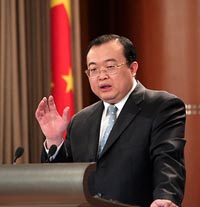China not to attend Iran talks because of scheduling conflict

China will not take part in talks on Iran's nuclear program planned for Monday because of a scheduling conflict, the country's Foreign Ministry said, adding that it was not trying to dodge discussion of further sanctions against Tehran.
The talks planned for Monday among representatives of the five permanent Security Council members and Germany had to be put off because China said it would not attend.
China agreed to earlier sanctions against Iran but opposes toughening them.
"We realized that the Iranian meeting was in conflict with our previously set schedule so that is not a problem with China, it is a technical issue," Foreign Ministry spokesman Liu Jianchao said at a news briefing.
Liu said Assistant Foreign Minister He Yafei, who is responsible for dealing with Iran, had long been committed to accompanying Premier Wen Jiabao at the Association of Southeast Asian Nations summit that started Monday in Singapore.
"Our position (on Iran) has never changed," Liu said. "We believe we need to promote the peaceful solution of this issue through negotiations and dialogue ... We also hope that the Iranian side will take seriously the international concerns and show flexibility."
Iran maintains that its program is purely for peaceful purposes. But Western nations fear the country's uranium enrichment activities are a pathway to Tehran's development of nuclear arms.
A report released last week by the U.N.'s nuclear watchdog agency found Iran has been generally truthful in the information it has provided to the agency about aspects of its nuclear activities. But the International Atomic Energy Agency said it still could not rule out that Iran had a secret weapons program because of restrictions Tehran placed on its inspectors two years ago.
While the U.N. Security Council's five permanent, veto-wielding members have been trying to find a way to get Iran to abandon uranium enrichment, China and Russia - two of the five - have repeatedly voiced opposition to a third round of sanctions. This has frustrated efforts by the council's other permanent members - the United States, France and Britain - to further pressure a defiant Iran.
An delegation from the European Union - which is also considering more sanctions against Tehran - is due in Beijing on Nov. 28. Liu said officials would discuss Iran at that meeting.
Subscribe to Pravda.Ru Telegram channel, Facebook, RSS!


